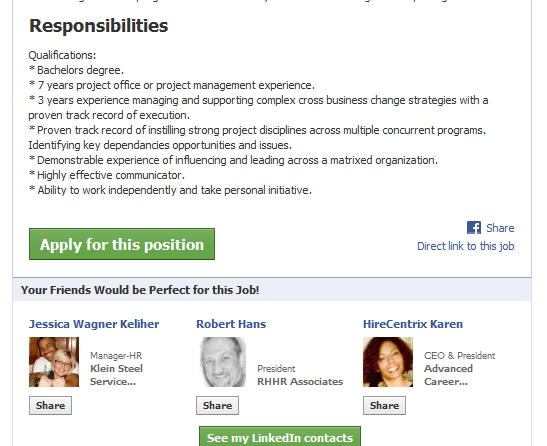Recruiting on Facebook? Like Fishing Where the Fish Are
Today the folks at BranchOut, the professional networking application built on top of Facebook announced the general availability of Recruiter Connect, their new recruiter focused product designed to provide a platform to allow corporate recruiters to more effectively source candidates from Facebook's 800 million or so users, build private talent networks from which to cultivate candidates, and tap into the social graphs of employees and other recruiters in the organization.
I was able to see a demonstration of the product and ask some questions of the BranchOut team in advance of the launch today. From the functionality that I saw, and as you might be able to tell from the screen grabs attached to this post, the Recruiter Connect application is clean, easy-to-understand, and has a nice intuitive design and flow. As I watched the demo one of my notes simply read, 'This is really cool.' Maybe not a particularly insightful observation on my part, but still important I think. Enterprise applications, in a way, are not just for the enterprise anymore. Meaning that users of enterprise apps today, especially ones tied to consumer oriented social platforms, need to almost mimic the design, layout, flow, and feel of the fun to use and no explanation required to get going public social networks. Click for full size image
Click for full size image
I'll have to admit I was personally kind of slow to come around to the idea of recruiting on Facebook, at least conceptually. Perhaps it was too many grad students over the past few years indicating they'd never see a reason or desire to want to be recruited via a social network seen to be a personal space, meant for sharing updates and photos with close friends and family. But over the last two years or so attitudes even among the most reluctant seem to have shifted, and as social networks in general, and Facebook in particular, have become such a central component of online identity, for the making and sustaining of social connections, and these days for seeking job opportunities and strengthening professional contacts; the ability to successfully tap into Facebook for sourcing and recruiting is fast becoming an essential capability for many organizations.
So if you are warming up to the idea that since everyone is on Facebook, (something you really can't say for LinkedIn, and definitely not Twitter, and certainly not some of the other job board or professional communities out there), then understanding the unique Facebook environment, articulating the correct approach and strategy, and importantly, finding the right tools to enable your social sourcing and recruiting strategies on Facebook; are probably on your agenda or soon will be as a corporate recruiting leader. Click for full size image
Click for full size image
And for now BranchOut is leading in that space. Yes, there are lots of other applications and solutions that have either centered on Facebook as a sourcing/recruiting platform, or have augmented their existing ATS or other solutions to connect with and attempt to exploit the Facebook social graph, and I am sure they will be many more to come; but for now it seems like they're all chasing. Either chasing the platform itself and the attitudes and inclinations of its users, or chasing the first movers, (like BranchOut), in fear of missing their passage to social recruiting success.
Though the future past 18 months or so is just about impossible to predict, Facebook isn't going away anytime soon. And neither is most organizations' need to continually feed the talent beast, even in these tough economic times. So if the talent are mostly swimming around on Facebook, then you probably ought to consider how to drop a line in that ocean, and the tools from BranchOut are a good place to start.

 Steve
Steve


